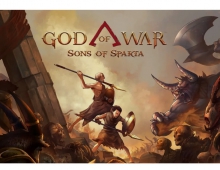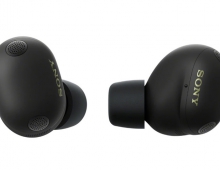
Sony PSP draws crowds on first day
Game fans stood in lines through a chilly Tokyo night to be among the first in the world to get their hands on Sony's PlayStation Portable, the consumer electronics firm's first handheld game machine.
About 200 000 of the sleek black devices, able to play movies, music and games, went on sale early Sunday morning as part of a drive by Sony to loosen rival Nintendo's iron grip on the market for handheld game machines.
The PlayStation Portable (PSP), at a discounted launch price of 19 800 yen ($189), went on sale 10 days after the successful launch of Nintendo DS, a game machine the size of a paperback book with a wireless connection and two screens, one of which is touch-sensitive and works with a pen-like device.
Analysts say both will sell well this holiday season, bringing the biggest buzz to the sector since Sony launched its PlayStation 2 (PS2) game console in 2000, although Nintendo's much greater production capacity will give it an initial edge in sales.
Excitement over PlayStation Portable, with high-quality graphics normally only seen on a full game console, has been building for months with the Japanese press eagerly comparing it with the rival Nintendo DS, made by the company that brought the world games featuring characters Pokemon, Mario and Donkey Kong.
"With the DS you can only play games, but with the PSP you can also play music and movies. There is added value there," said Asuka Senaga, a 24-year-old in the line outside an electronics retailer at 11pm on Saturday.
Internet connection
Equipped with a wireless LAN feature, the Sony machine allows users to play games with each other over the Internet.
Ahead of Sunday's launch, fans bought 500 PSPs for about 30 million yen ($286 000) in an online auction on 25 November for victims of an earthquake in northern Japan in October -- paying a premium of up to 13 times the proposed retail price to get ahead of the pack.
Nintendo's defence of its stranglehold on portable game machines has included an advertising blitz featuring pop singer Hikaru Utada. It set up sidewalk booths to capture the attention of passers-by as it also pushes to attract customers beyond its base of young game fans for the new machines, which cost 15 000 yen ($143).
Retailers face likely shortages of both machines but Nintendo is likely to win the bulk of initial sales as it is able to ship more than five times as many units as Sony.
Nintendo's head start
Nintendo launched DS in the US on 21 November and in Japan on 2 December, in time for the holiday spending rush, and has raised its forecast of shipments this year by 40% to 2.8 million units.
Sony has said it will ship just 500 000 units in Japan by the end of the year and it will miss the holiday season in the US and Europe, where a launch is expected early next year.
Some American gamers are not willing to wait. Last week a PlayStation Portable with one game was bid at $560 on eBay's auction Web site -- the price rising even though it was a Japanese-language version and the seller did not yet have it in hand.
Analysts have said the DS and PSP will capture different markets, with Nintendo keeping its grip on game fans and Sony reaching out to new consumers.
"The PSP is trying to create a completely new market beyond traditional games. I am rooting for them, but it will be difficult," said Hirokazu Hamamura, president of game magazine publisher Enterbrain.
Nintendo would hang on to its 58.1 million users of its existing Game Boy Advance machines, who can play their old games on the new Nintendo machine, he said.
Sony has said it plans to ship 3 million PSP units worldwide by 31 March while Nintendo expects to ship five million units.
Industry watchers generally expect the two companies to hit those targets, but say the availability of attractive software will play a key role in determining who wins the sales war.
($1=104.98 Yen)
The PlayStation Portable (PSP), at a discounted launch price of 19 800 yen ($189), went on sale 10 days after the successful launch of Nintendo DS, a game machine the size of a paperback book with a wireless connection and two screens, one of which is touch-sensitive and works with a pen-like device.
Analysts say both will sell well this holiday season, bringing the biggest buzz to the sector since Sony launched its PlayStation 2 (PS2) game console in 2000, although Nintendo's much greater production capacity will give it an initial edge in sales.
Excitement over PlayStation Portable, with high-quality graphics normally only seen on a full game console, has been building for months with the Japanese press eagerly comparing it with the rival Nintendo DS, made by the company that brought the world games featuring characters Pokemon, Mario and Donkey Kong.
"With the DS you can only play games, but with the PSP you can also play music and movies. There is added value there," said Asuka Senaga, a 24-year-old in the line outside an electronics retailer at 11pm on Saturday.
Internet connection
Equipped with a wireless LAN feature, the Sony machine allows users to play games with each other over the Internet.
Ahead of Sunday's launch, fans bought 500 PSPs for about 30 million yen ($286 000) in an online auction on 25 November for victims of an earthquake in northern Japan in October -- paying a premium of up to 13 times the proposed retail price to get ahead of the pack.
Nintendo's defence of its stranglehold on portable game machines has included an advertising blitz featuring pop singer Hikaru Utada. It set up sidewalk booths to capture the attention of passers-by as it also pushes to attract customers beyond its base of young game fans for the new machines, which cost 15 000 yen ($143).
Retailers face likely shortages of both machines but Nintendo is likely to win the bulk of initial sales as it is able to ship more than five times as many units as Sony.
Nintendo's head start
Nintendo launched DS in the US on 21 November and in Japan on 2 December, in time for the holiday spending rush, and has raised its forecast of shipments this year by 40% to 2.8 million units.
Sony has said it will ship just 500 000 units in Japan by the end of the year and it will miss the holiday season in the US and Europe, where a launch is expected early next year.
Some American gamers are not willing to wait. Last week a PlayStation Portable with one game was bid at $560 on eBay's auction Web site -- the price rising even though it was a Japanese-language version and the seller did not yet have it in hand.
Analysts have said the DS and PSP will capture different markets, with Nintendo keeping its grip on game fans and Sony reaching out to new consumers.
"The PSP is trying to create a completely new market beyond traditional games. I am rooting for them, but it will be difficult," said Hirokazu Hamamura, president of game magazine publisher Enterbrain.
Nintendo would hang on to its 58.1 million users of its existing Game Boy Advance machines, who can play their old games on the new Nintendo machine, he said.
Sony has said it plans to ship 3 million PSP units worldwide by 31 March while Nintendo expects to ship five million units.
Industry watchers generally expect the two companies to hit those targets, but say the availability of attractive software will play a key role in determining who wins the sales war.
($1=104.98 Yen)





















